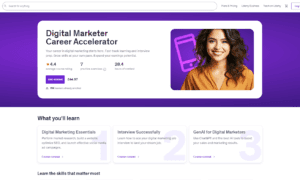Recently, online learning has become more and more popular, and against the background of Zoom lessons in regular schools and universities, the question immediately arises whether it is necessary to get together in the classroom and listen to what the teacher says if it’s much more convenient to do all this at home, with a cup of coffee? Let’s figure it out together.
Who is suitable for online education
Online education has its strengths, thanks to which this system can partially compete with the classical one. Let’s determine who it will be especially convenient for.
Someone who has little time
There are times when a student has to work since his first year of college. It’s easier to combine work and study, studying at an online university. First, the training is usually held at a convenient time for most: in the evening. In addition, there are almost always recordings of the last lesson, and if all lectures are initially recorded – even easier, you can watch them at a convenient time, pause, and so on. Classical education does not have such flexibility: if you plan to work, then your option – correspondence and evening forms of education, because at the “full-time” no one will ask whether it is convenient for you to attend classes on the schedule.
For those who are not ready for expensive studies
It takes 4-5 years to study at the university; with online courses, everything is much faster: 2-10 months – and you are a happy owner of a profession. Of course, the second option is much more profitable in terms of financial costs, but you get a fairly limited amount of knowledge compared to the university. This has both pluses and minuses. Still, a classical university offers students the to broaden their horizons, and not just become a narrowly focused specialists.
For those who only need practical information
In an online course, you choose a program and get the knowledge and skills you need to work in your specialty. You’re given a brief but succinct summary. In some cases, that’s enough to get you into the profession, but you’re more likely to have to go into related fields on your own. For example, at university, they teach journalists not only how to write texts, but also how to take photographs, how to speak correctly, how to know your rights and responsibilities, how to work with graphic editors, and how to understand politics, economics, sociology, and culture. Online courses will offer you to develop only the skills of editing and copywriting, everything else you will have to learn on your own or pay for new courses.
To someone who cares about being mobile
Unlike classic education, online courses can be taken anywhere. You don’t need to travel anywhere, just have access to the Internet. For residents of large cities, this is also relevant, but the problem is not so acute, because they always have access to many universities. But for the population of small villages and provincial towns, where there is virtually no access to higher education, this approach is very attractive.
In what ways online education loses out to a classical university
Broad outlook.
As we have already said, online learning is much cheaper than tuition at the university. But if you study only one subject in the course syllabus, you won’t get the real, specific knowledge you need from related fields.
Concentration
At a classical university you are involved in the learning process all the time: every day you have lectures, seminars, and colloquia. You have to process a lot of information, and this contributes to complete immersion in the subject. Of course, you will get a couple of lectures, then you will be offered to write an essay, a test paper, and at the end of the semester, you will take an exam. This is a big plus of higher education – students constantly have to repeat what they have already learned, concentrate their attention on this or that topic, understand it.
Checking Assignments
In online universities, too, there is a cross-section of knowledge, but it does not cause the trembling in the knees, as during the answer under the gaze of the teacher. Students prepare for exams at universities for weeks, buy research paper, because even a “C” grade has to do something. University students are interested in a good grade on their diploma, and teachers are interested in academic performance. That is why students of classical universities have to study dozens of definitions, delve into the themes and prepare for tricky additional questions. And this format of knowledge assessment implies having that very knowledge in students’ heads, rather than being able to ask Google at any time during an online test.
Documentary proof
After completing online learning (any course), students usually receive some sort of “diplomas” or “certificates” that prove that the person listened to or did something. From course certificates, it’s often hard to know how well a student was able to learn a trade. And although these papers are also quoted, so far in our country university diplomas have more weight. For employers, they still seem a more reliable proof of knowledge: still, a person who studied in an educational institution for 4-5 years, passed the exams.
Conclusion
In 2021, online universities cannot become a full-fledged substitute for classical higher education. It is a supplement, specific information on a strictly defined topic, but no more. In the future, as technology develops and training programs are optimized, the situation may change. But while this has not yet happened (and it is unlikely to change radically in the coming years), we advise you not to neglect your higher education studies.



































